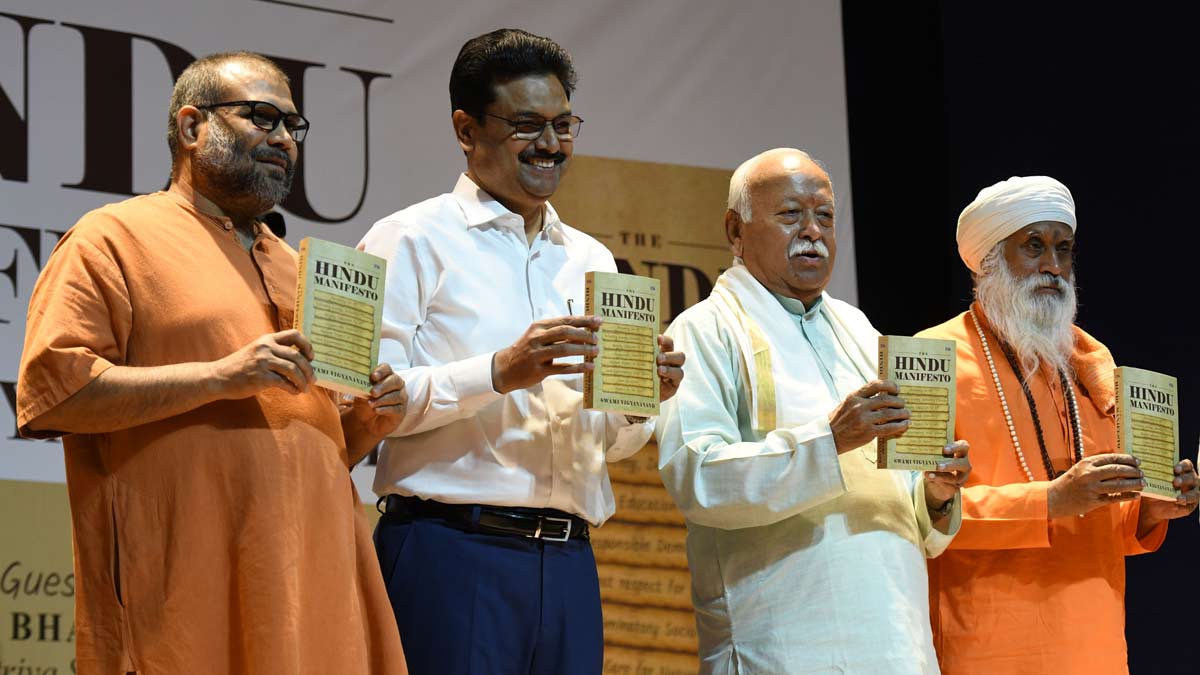'King must perform his duty': RSS chief's message to govt at book launch
 RSS chief Mohan Bhagwat during the release of the book 'The Hindu Manifesto' penned by Vishwa Hindu Parishad's joint general secretary Swami Vigyananand | Sanjay Ahlawat
RSS chief Mohan Bhagwat during the release of the book 'The Hindu Manifesto' penned by Vishwa Hindu Parishad's joint general secretary Swami Vigyananand | Sanjay Ahlawat
"We never insult or harm our neighbours. But if someone stays evil, what is the other option? The duty of the king is to protect his subjects. The King must perform his duty," RSS chief Mohan Bhagwat said at a book release function on Saturday in Delhi.
The release of the book The Hindu Manifesto penned by Vishwa Hindu Parishad's joint general secretary, Swami Vigyananand, an IIT graduate turned monk, started with a two-minute silence for those killed in Pahalgam.
Though the gathered audience expected a message from Bhagwat on the terror attack, the RSS chief didn't directly refer to it, but his oblique reference left little doubt what he wanted to convey. His reference to "King must perform his duty" in a civilizational context was also interpreted as a message to the government to take decisive action against the terrorists.
Talking about those who cannot be reformed, Bhagwat said there is no other way left to send them where they belong. He even gave the example of Ravan, who despite all the makings of a good man, chose the wrong path. The only means left to deliver him was his destruction by the Lord. "It was not violence, but nonviolence."
"Non-violence is our nature, our values. But some people will not change, no matter what you do, they will keep troubling the world, so what to do about it? Non-violence is our religion. Teaching a lesson to hooligans is also our religion, " Bhagwat said.
The RSS chief argued that the world needed a new roadmap, which can only be given by India. The world has experimented with different systems and teachings but has not given the desired results, Bhagwat added.
Bhagwat reflected on the failure of purely materialistic development models that have led to dissatisfaction and environmental degradation across the world.
He highlighted India's civilizational path as the “third path” — a harmonious balance between material and spiritual well-being.
"Historically, Bharat's influence was widespread without conquest, but complacency and narrow-mindedness led to the neglect of true Dharmic values," Bhagwat said.
Releasing the book, Bhagwat said the book has proposed a way which should be widely discussed to arrive at a consensus.
The book talks about eight sutras: prosperity for all; defeating the enemy, defending citizens; quality education for all; responsible democracy; highest respect for women; nondiscriminatory social system; care for nature; and respect for the land.
Talking about the book, the author, Swami Vigyananand said that, unlike Western capitalism or socialism, Hindu tradition proposes a balanced economic model that values wealth creation alongside fair distribution.
"True Dharma includes the responsibility to destroy enemies without misplaced mercy, something we forgot in the past with disastrous consequences."
Rooted in a republican spirit, Hindu civilization advocates for responsible governance with public participation and rejects the mentality of passive acceptance of rulers, Swami said.
The second half of the book lays the foundations for a civilizational renaissance, talking about safety, dignity, and respect for women, inspired by figures like Draupadi.
The other sutras include: a non-discriminatory society based on Dharma, with the correct understanding of Varna and Jati; environmental stewardship, reflecting deep-rooted reverence for nature; and respect for the sacred geography and cultural unity of India.
According to the author, The Hindu Manifesto is a call to realign society with the eternal wisdom of Hindu Shastras (treatises), rooted in sacred texts such as the Vedas, Ramayana Mahabharata, Arthashastra.
The book argues that the Hindu society has historically fostered prosperity, ethical leadership, and military resilience while ensuring justice and security.
India